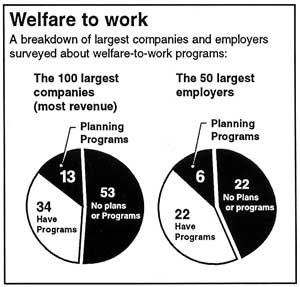
Welfare-to-work hiring starts slowly
PUSH: Omni trains
addicts and homeless
By Michael White, Associated Press
CARSON - Two
years ago April Herrera was living the nightmare life of a heroin addict,
homeless and using her welfare check to help support a 15-year
habit.
Nowadays, she’s a model employee at a fast-growing computer products
company, recently promoted and optimistic about her future.
Herrera, 38 is
among dozens of workers who benefited from a policy at Omni Computer Products
that focuses on hiring the down and out. 
About one-third of the
company’s employees have been recruited through parole offices, halfway houses,
homeless shelters and Alcoholics Anonymous.
After they join the payroll,
Omni supports them with training programs, motivational seminars and, in some
cases, loans.
In return, such workers have helped Omni, which recycles and
markets ink cartridges for computer printers, reach $25.5 million in sales
during 1997.
“I had enough people here who really cared about me,” Herrera
said during a recent interview.
The architect of the policy is Omni president
and chief executive Gerald Chamales, who fought his own battle with drug and
alcohol addiction before founding the company in 1980. He started the hiring
policy 12 years ago.
“I guess you could say we recycle human beings,” said
Chamales.
Among those who stay on the job for more than six months, the
retention rate for disadvantaged workers is 26 percent, compared to a 16 percent
rate for others, Chamales said.
Omni recruiters look for indications that
prospective workers are committed to bettering their lives.
Chamales argues
others could emulate his policy with enough commitment and patience.
Training
classes must start with the basics: how to dress, how to speak to a client or
colleague, how to shake hands and look someone in the eye.
Costs can be
high: Omni has $250,000 out in loans to workers who lost credit or built up
debt.
Nevertheless, the policy has made his company stronger, Chamales
says.
When you get the right people they will give you 300 percent because
they’re so desperate to rebuild their lives,” he said.